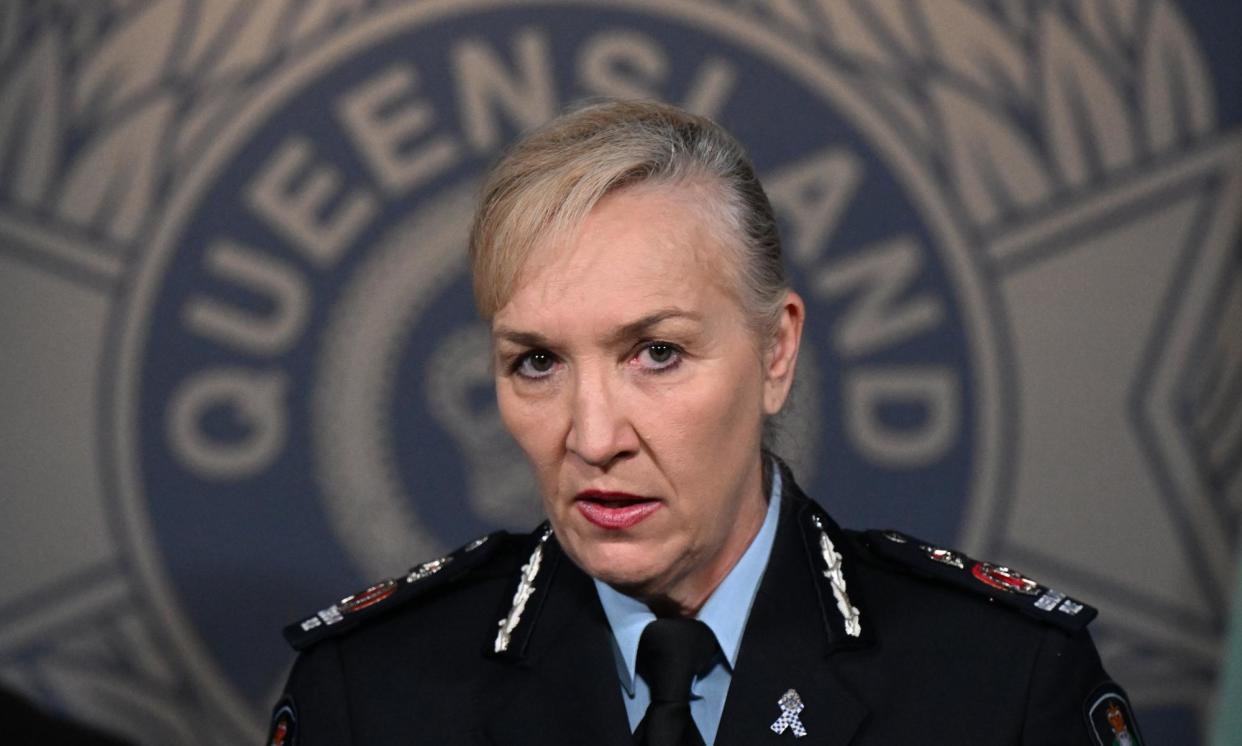Stuck in limbo, Katarina Carroll was a scapegoat for Queensland’s anxieties over youth crime

Some cabinet ministers wanted Katarina Carroll, the outgoing Queensland police commissioner, sacked in late 2022.
A commission of inquiry into police responses to domestic violence had just found that “a failure of leadership” had allowed racism, sexism and misogyny to flourish in the Queensland police service.
In the end, she was saved by then-premier Annastacia Palaszczuk, who argued the state could not make its first female police commissioner a scapegoat for the behaviour and failures of (mostly) male officers.
Carroll resigned on Tuesday, a scapegoat for the policy failures and community anxiety that have dogged the state government in relation to youth crime.
The resignation – a few months before her contract expired in July – was also hastened by recent pressure from rank and file officers, who spoke out publicly at the standing down of an officer over a pursuit that ended with a stolen vehicle being rammed by police.
Waning support
Behind the scenes, Carroll had few vocal supporters left. It is part of the reason the pressure brought to bear during the past few weeks was so effective.
The police inquiry brought a spotlight to serious cultural issues within the QPS, where complaints are “brushed aside” and “those who complain are the ones who are shunned and punished”. It said a “culture of fear and silence” existed in the service.
Guardian Australia’s story on Sunday – revealing that murdered Gold Coast woman Kelly Wilkinson had been described by an officer as “cop shopping” – highlights how those cultural problems are reflected in the way police respond to women seeking help.
At first, Carroll opposed the inquiry. She denied there were widespread cultural issues. She declined an invitation to appear. When she was eventually summoned to attend, Carroll seemed caught off-guard by many of the issues raised.
Those who defend Carroll speak about internal police politics. They say she cannot – like a chief executive at a big corporation – just take a big broom to deep-seated problems. Acknowledging cultural issues would have damaged any commissioner in the eyes of “old guard” officers and the police unions, who hold considerable influence.
It is a theme repeated throughout Carroll’s tenure. She championed a “service delivery redesign project” that was to be her major practical reform, until it was scrapped after pressure from the union.
The police discipline system collapsed after an appeal supported by the union, requiring law amendments to validate sackings and other sanctions. Some promotions processes were similarly found to be unlawful.
The reforms demanded by the commission of inquiry are in many cases well behind schedule.
One long-serving officer said a view from within the ranks was that Carroll had been stuck in a state of limbo, often talking about reform when caught on the defensive.
In the end, the old guard still turned on her. Longstanding police union boss Ian Leavers told the Courier Mail last week the “police hierarchy are so out of touch with frontline policing”.
Legacy
The Queensland police minister, Mark Ryan, hinted strongly that he thought the new commissioner would come from the current ranks rather than elsewhere. The government is also likely to appoint a permanent commissioner quickly, rather than risk seeming like the police service is in a state of flux during an election year.
Carroll’s resignation gives the state government a welcome opportunity to reset on the youth crime issue, which has become politically damaging.
A poll in the Courier Mail this week showed more than 40% of people, when asked to think about youth crime, said they felt unsafe in their communities.
Yet amid ongoing public hand-wringing about youth crime, the data shows that Queenslanders should be far more fearful of the threat from within. Increases to crime rates are largely being driven by domestic violence – particularly breaches of protection orders – not the sorts of youth issues that cause most angst and fill most column inches.
On Tuesday, speaking about policing challenges, Carroll said since the start of the pandemic there had been “extraordinary increases” in domestic and family violence.
It’s hard not to hark back to the interview she gave in 2020, where she cast forward to her legacy as police commissioner.
“One of my legacies, I want to be that I have tackled [domestic violence] head-on, and had some positive impact in our community,” she said.
• In Australia, the crisis support service Lifeline is on 13 11 14 and the national family violence counselling service is on 1800 737 732. In the UK, Samaritans can be contacted on freephone 116 123 and the domestic abuse helpline is 0808 2000 247. In the US, the suicide prevention lifeline is 988 and the domestic violence hotline is 1-800-799-SAFE (7233). Other international helplines can be found via www.befrienders.org

 Yahoo News
Yahoo News 
